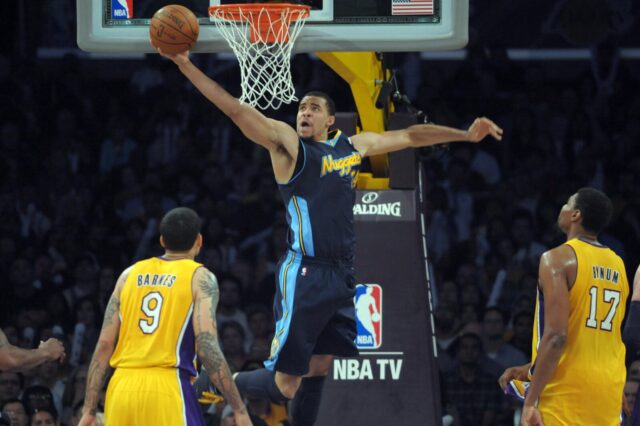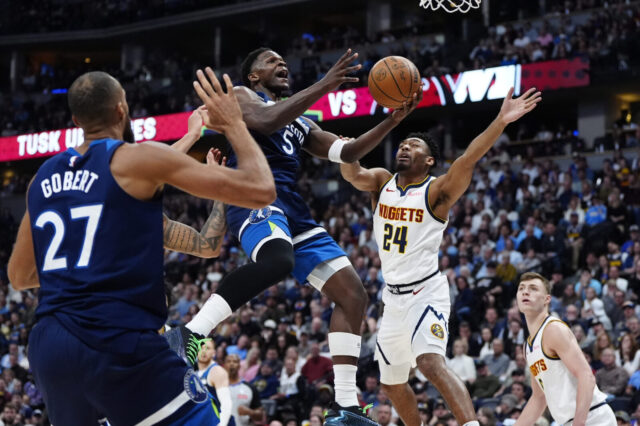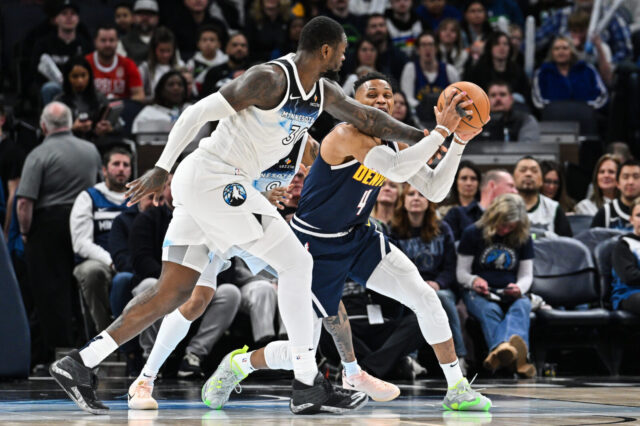In the last 20 years of NBA basketball (since 1993), there have only been 8 franchises to win an NBA Finals out of a possible 30. Of those 30, only 17 franchises have even reached the Finals in that same span.
13 hard luck franchises – including the Denver Nuggets – never even made it to the Finals in that period (though the NBA did add the Memphis Grizzlies, Toronto Raptors and Charlotte Bobcats as expansion teams in 1995 and 2004, respectively).
Of the teams who actually reached the Finals between 1993 and 2013, only a handful could truly be considered "small market", which I will (personally) define as outside the top 10 in "number of TV homes":
- Phoenix Suns (1993, lost to Chicago Bulls) – 12th in number of TV homes
- Orlando Magic (1995, lost to Houston Rockets; 2009, lost to Los Angeles Lakers) – 19th
- Seattle Supersonics (1996, lost to Chicago Bulls) – 13th, now the Thunder
- Utah Jazz (1997-1998, lost twice to Chicago Bulls) – 32nd
- Indiana Pacers (2000, lost to Lakers) – 27th
- Cleveland Cavaliers (2007, lost to San Antonio Spurs) – 18th
- Oklahoma City Thunder (2012, lost to Miami Heat) – 45th
The other "small market" teams that both managed to reach the Finals and win are definitely the exceptions to the rule:
- Detroit Pistons (2004, won over Los Angeles Lakers) – 11th
- Miami Heat (2006, won over Dallas Mavericks; 2012, won over Oklahoma City Thunder; 2013, won over San Antonio Spurs) – 16th
- San Antonio Spurs (1999, won over New York Knicks; 2005, won over Detroit Pistons; 2007, won over Cleveland Cavaliers) – 37th
More often than not, the teams which have actually managed to reach the NBA Finals and win are located in the largest top 10 media markets in the United States – Los Angeles, Chicago, Boston, Dallas, Houston.
Only 10 teams from markets outside the top 10 managed to reach the Finals in the last 20 years, and of those teams, only 3 franchises managed to win a total of 7 championships. Two of those franchises featured multiple future Hall of Fame players (San Antonio and Miami), and the success of the "no star" Detroit Pistons team from 2004 has yet to be replicated. The other 13 championships were split between Chicago, Boston, Dallas, Los Angeles and Houston.
In an era where the endorsements an athlete signs can be an order of magnitude larger than the contracts a franchise can offer a player, the larger the market, the more lucrative it is for a talented player to go there, whether or not he has any particular draw to that franchise or city.
Simply put: money talks, and the small market teams just don't offer enough. Even when they are able to offer maximum contracts to the players they desperately want to keep, these small markets just can't compete with the lucrative exposure offered by living in the major metropolitan areas around the country.
We’ve seen superstar athletes abandon the teams which drafted and developed them multiple times throughout the last decade. LeBron James leaving Cleveland for Miami. Carmelo Anthony departing Denver for New York. Dwight Howard thumbing his nose at Orlando first for Los Angeles, then for Houston. You could look at Anthony and Howard’s departures through the fact that they were trades, and not free agency, but ultimately I do not believe either of them would or could have gone anywhere else.
Even though in some cases they leave the extra compensation of a possible max contract from their former team behind, they make up for that with the ability to build themselves into their own brand in an area where there will be far more eyes watching them. Howard's an interesting exception in moving from Los Angeles to Houston, but the huge Chinese fanbase in Houston will probably make up for the drop in number of TV homes resulting from his move from the LA market.
There is a talent vacuum in the NBA, and that great sucking sound you hear is the NBA’s star players leaving their teams behind for a bigger market (the Spurs being perhaps the lone exception with the extraordinarily loyal and talented trio of Tim Duncan, Tony Parker and Manu Ginobili). Inevitably, smaller market franchises watch helplessly as the talents they drafted and developed get wooed away by the bright lights and megadollars of the big city.
So what can be done to help smaller markets keep their stars? Some have proposed lifting the cap on "max contracts", which would allow a franchise to pay a player whatever they felt that player was worth. For some teams with billionaire owners – hi, Stan Kroenke – this would be a huge boon, allowing those teams to offer contracts potentially far larger than what a competing franchise would be willing or able to pay. However, this still leaves the less well-off franchises out in the cold. Others have proposed greater revenue sharing, but as we saw during the last contentious CBA negotiations, getting these ultra-wealthy owners to give up more of their revenue is just about the last thing the NBA ownership group would be able to agree on.
Enter the NBA "franchise tag".
In the NFL, the concept of a franchise tag is used to designate a particularly skilled or star player as a "franchise player". Here's the definition of how that concept works in the NFL when a player is set to become an unrestricted free agent:
An "exclusive" franchise player must be offered a one-year contract for an amount no less than the average of the top five salaries at the player's position as of a date in April of the current year in which the tag will apply, or 120 percent of the player's previous year's salary, whichever is greater. Exclusive franchise players cannot negotiate with other teams. The player's team has all the negotiating rights to the exclusive player.
In essence, this concept as applied to the NBA would allow teams like Cleveland, Denver or Orlando to hold on to upcoming UFAs like LeBron James, Carmelo Anthony or Dwight Howard – if they felt they could absorb the hit to the salary cap. Adapting this concept to the NBA would probably require a reworking of the potential maximum contract deal offered, but is absolutely one which would help small market teams, even those without ultra-wealthy owners, avoid losing talent which is nearly impossible to get fair value for in a sign-and-trade or free agency scenario. Unless you're Masai Ujiri, of course.
A "non-exclusive" franchise player must be offered a one-year contract for an amount no less than the average of the top five salaries at the player's position for the previous year, or 120 percent of the player's previous year's salary, whichever is less. A non-exclusive franchise player may negotiate with other NFL teams, but if he signs an offer sheet from another team, the original team has a right to match the terms of that offer, or if it does not match the offer and thus loses the player, is entitled to receive two first-round draft picks as compensation.
For teams that wished to designate a franchise player but not lock themselves to a potentially untenable salary, a "non-exclusive" tag would allow that team to quickly rebuild via first-round draft picks if that player then signs an offer sheet from another team.
In an era where there are more and more players leaving the franchises which drafted them to form superteams, something needs to be done to prevent star talent from letting their former teams twist in the wind. A franchise tag concept is a simple, equitable way for teams to maintain their star(s), would allow franchises to mitigate the purgatory which so often accompanies the departure of high-level players, and would throw another roadblock in the way of superteams forming. The tricky part in the future would be convincing the players in a new CBA that this is something which would be beneficial for the league as a whole to improve competitive balance. The NFL is widely regarded as a league in which the owners hold the majority of the negotiating leverage – not so in the NBA, where the players union is much stronger and more likely to fight against a franchise tag as infringing upon a player's free agency.
Ultimately, something must be done to help smaller markets not continue to wallow in the depths of NBA mediocrity. Some might cry "talent dilution", sure, but I would much rather see a league in which many teams that are capable of intelligently building around a star that they worked so long and hard to develop have a shot instead of the same 5 or 6 franchises in the Finals year in and year out simply because they're able to lure the best players with their financial base. The success or failure of a team would still in large part depend on moves made by the team's management, but not having to start over with seasons of tanking to have a shot at a top draft pick … to get a potential superstar … who is likely to eventually leave for a large market team … would be a massive improvement over the current system.
What upcoming Nuggets free agent would you potentially designate as this team's "franchise player"? Is any current player on the Nuggets worth "exclusivity", if so?


